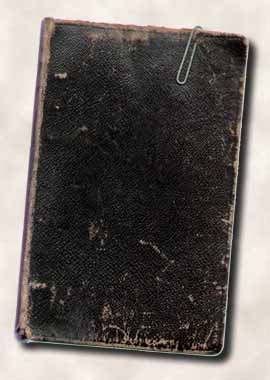image credit: Colin Galbraith
I recall when my father, a man of limited means, brought a copy of Webster’s New Collegiate Dictionary into our house. The old man knew I had academic promise and such a book, I’m sure he was told, would help me get ahead. I recall the reference book that survived to accompany me to college, sitting on top of the ancient, rumbling GE refrigerator. My paws were only to be on it when I was doing school work. Hardbound books were expensive.
Of course, I stretched out the time I spent doing homework to leaf through the dictionary’s bible-paper pages, learning new words and the black-and-white drawings of everything from magnetos to Piltdown Man. That habit remains with me, as does the wonderful dictionary. When I write, I often think “my God. I’m made of words. They are my surest companions.” If the office caught fire, I’d grab three things, in this order: the photo of my wife, the laptop, and the old dictionary. As I age, I find myself clinging to linguistic habits that, at times and to paraphrase T.S. Eliot, seem to be shards shored up against the ruin of our shallow times when language gets twisted to venal ends and louts shout into radio microphones.
The old book taught me a new lesson last week, while I was trying to find a precise definition for the loan-word “métier.” My enormous copy of the American Heritage Dictionary lacked the term. I turned to dad’s old standby and there it was, with enough context for me to employ the word properly.
Sven Birkerts, in his magisterial and sad work The Gutenberg Elegies, noted one of the effects of networked communications on our habits of language, self, and history. In all cases Birkerts sees a flattening of perspectives, a loss of nuance, and an erosion of propriety. I find that a bit prudish–I am a blogger, a smartass, and user of virtual worlds–but I will agree that nuance helps us to shape utterance to meaning. Without a good vocabulary, we exist in a semantic cage.
When I finished my M.A., my parents made the long drive to Bloomington, Indiana to attend the commencement. They asked what I wanted as a present, and I didn’t hesitate: another hardbound dictionary. We got an updated version of the New Collegiate at the IU Bookstore, and it too lives with me. When one of my great-nephews or nieces goes to college, if he or she is like me and as likely to consult paper as well as pixels, I’ll send that newer edition along.
That’s a ways off, so the older copy will have a vacation at a bindery soon, to get the spine repaired and perhaps a new library binding. It should then last the rest of my days on this planet, a constant touchstone for my life, if only to see what time does to our language.

Thanks for the credit – liked the article too. 🙂
Cheers,
Colin